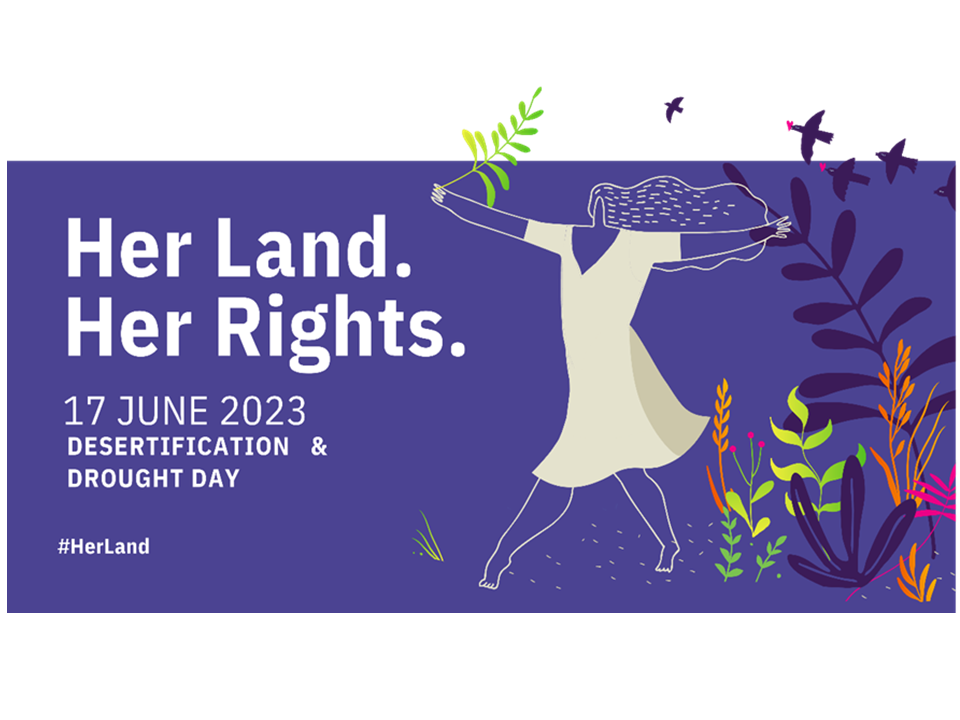Pick Up
800. World Day to Combat Desertification and Drought: Her Land. Her Rights.

800. World Day to Combat Desertification and Drought: Her Land. Her Rights.
Today marks the 800th Pick up article. Tomorrow, June 17, is World Day to Combat Desertification and Drought.
Desertification is defined by the United Nations Convention to Combat Desertification (UNCCD) as "land degradation due to multiple factors (including climate change and human activities) in arid, semi-arid and dry semi-humid areas". Land degradation in drylands is called desertification. Desertification here does not refer to the expansion of existing deserts, but to the decline in land productivity due to excessive cultivation and grazing, poverty and political instability.
Desertification is a global problem with serious implications for biodiversity, the environment, poverty, socioeconomics and sustainable development. Drylands are already vulnerable, and desertification could displace some 50 million people within the next decade. Desertification has played an important role in human history, contributing to the collapse of several major empires and the forced displacement of local populations. Today, however, the rate of land degradation is estimated to be 30 to 35 times higher than in the past. Approximately 2 billion people depend on dryland ecosystems, 90% of whom live in developing countries. In these areas, drylands are being used for agriculture to cope with population growth, and in marginally more productive areas, overgrazing has depleted soils and overexploited groundwater. Last year, the theme "Rising up from drought together" highlighted the need for early action to avoid disastrous consequences for humans and the Earth's ecosystems.
This year's theme is Her Land. Her Rights. Women play a vital role in the health of the land, but they may not control it. Women face significant barriers to land rights, and in many areas discriminatory laws and practices still exist that impede their rights. As a result, women may be most affected when land degradation leads to water scarcity. For this reason, the United Nations emphasizes that efforts to ensure women's equal access to land and related assets are a direct investment in the future of women and humanity. It calls for women to be at the forefront of land restoration and drought recovery efforts.
As a sustainable land management practice to combat desertification, JIRCAS has developed the Fallow Band System, which can both control soil erosion, a major cause of land degradation, and increase soil productivity in West Africa, and a shallow subsurface drainage system to control soil salinization in Uzbekistan. In addition, JIRCAS has developed a pastoral management system to reduce the risk of extreme weather events in Mongolia.
Ikazaki et al. (2011) https://doi.org/10.1080/00380768.2011.593155
Okuda et al. (2020) https://doi.org/10.3390/w12113207
Oniki et al. (2018) https://doi.org/10.1016/j.rama.2018.02.003
The "Sustainable land management" project, launched in April 2021, focuses on the Indo-Gangetic Basin in India, where irrigation-induced salinization is severe. We are trying to develop countermeasures against salinization through low-cost irrigation and drainage technology that farmers can work on as part of their farming activities.
Sustainable land management https://www.jircas.go.jp/ja/program/proa
In addition, in the "Africa upland farming system" project, we are focusing on Burkina Faso in West Africa. In order to widely disseminate sustainable land management technologies such as the “Fallow Band System” that we have developed so far, we are trying to develop a soil conservation enhancement scheme and a drought-resistant soil and crop management technology.
Africa upland farming system https://www.jircas.go.jp/ja/program/prob
Contributor: ONISHI Jun-ya (Rural Development Division)
